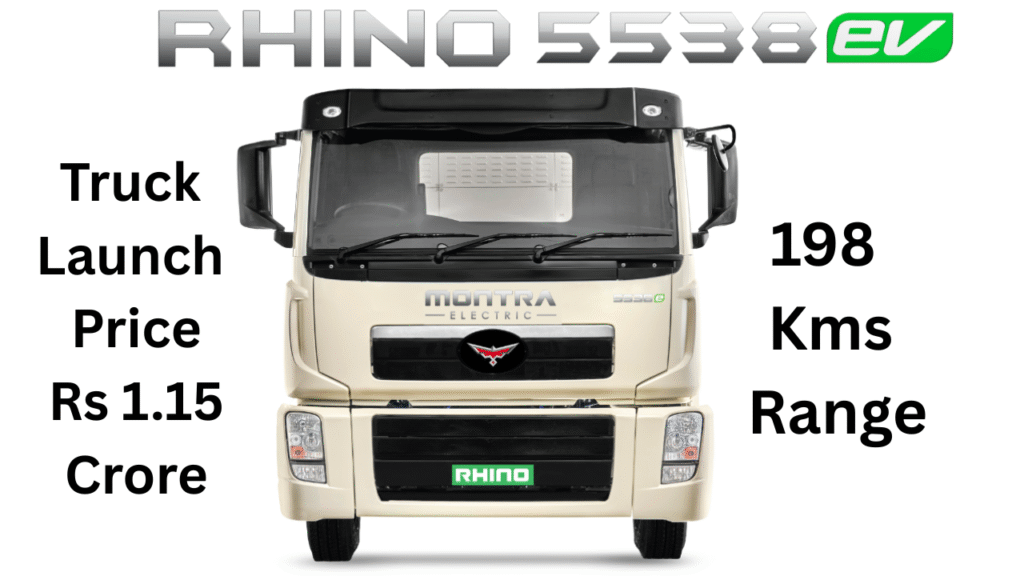Montra Electric unveils the Rhino 5538 EV 4×2 truck with 282 kWh battery, 380 HP, battery-swap in 6 mins, 55-ton GVW. Redefining heavy EV trucking in India.
Montra Electric, the mobility arm of the Murugappa Group, has officially launched its latest heavy commercial vehicle — the Rhino 5538 EV 4×2 TT — taking a bold step in the electrification of India’s logistics sector. This unveiling is not just another EV launch; it introduces battery swapping, a 55-ton GVW capability, and a host of technical innovations built for the Indian commercial ecosystem. In this post, we’ll dive deep into its specifications, features, strategic significance, and what it means for the future of freight transport in India.
Key Specifications of the Rhino 5538 EV
Power, Torque & Drivetrain
The truck is powered by a PMSM (Permanent Magnet Synchronous Motor) delivering 280 kW (~380 HP). Peak torque output reaches 2,000 Nm, which is crucial for heavy-load acceleration and hill climbs. Transmission is a 6-speed Automated Manual Transmission (AMT).
Battery, Range & Charging
The truck houses a 282 kWh LFP (Lithium Iron Phosphate) battery pack. Under standard test conditions, its claimed range is ~198 km per charge. For fast charging, it supports up to 240 kW DC, enabling charging from 20 % to 100 % in about 60 minutes.
Payload & Weight
The truck is designed for a Gross Combination Weight (GCW) of 55,000 kg (55 tons), making it suitable for heavy freight. Gradeability: It can continuously manage 18–20 % gradients, which is vital for challenging terrains. Suspension and chassis: heavy-duty frame, front parabolic leaf springs, rear bogie/semi-elliptical suspension setups, strong axles.
Battery Swapping & Variants
The Rhino 5538 comes in two variants: one with fixed battery pack and another with battery-swapping capability. The battery swap system can complete a swap in under 6 minutes, compared to over 60 minutes via charging. The swap station setup uses a 7+1 configuration, capable of 160+ swaps per day under peak usage. The swap station is designed as a drive-through layout, allowing tractor-trailers to pass through like toll booths.
Launch, Pricing & Support
Montra launched the Rhino 5538 EV at its facility in Manesar, Haryana. At the same time, the company inaugurated an automated battery assembly plant, with women operators monitoring operations — a first in India for EV battery manufacturing.
The ex-factory price for the fixed battery version is quoted at ₹1.15 crore, while the battery-swap variant is priced slightly higher at ₹1.18 crore.
Furthermore, Montra is offering a 10-year / 9-lakh km AMC (Annual Maintenance Contract) with a 95 % uptime guarantee for fleet operators.
For more details visit official site: here
Why This Launch Matters
Bridging the heavy-duty EV gap: While many EV efforts focus on smaller vehicles, the Rhino 5538 aims at the freight backbone—heavy transport. Battery swapping solves downtime challenge: For fleet operators, reducing idle time is critical. A 6-minute swap solves one of EVs’ biggest pain points in commercial use. Local manufacturing & battery ecosystem: The new automated plant helps in localization, scale, and supply chain resilience. Proof of reliability: The existing Rhino 6×4 series has cumulatively logged over 1.2 crore km in real usage.
Challenges Ahead
Infrastructure scaling: To fully benefit, swap stations must be widely deployed across highways and logistics corridors. Range and load tradeoffs: In real-world usage with heavy payloads, range may drop, so operators must plan wisely. Battery lifecycle & cost: Ensuring long battery life and managing replacement costs is vital for total cost of ownership (TCO). Fleet adoption and financing: Convincing logistics firms to transition from diesel to electric at scale will require strong incentives, performance guarantees, and financing support.
The Montra Electric Rhino 5538 EV represents a bold step in India’s transition toward zero-emission freight. With high power output, fast charging, battery swapping, and a 55-ton capacity, it is engineered to be a practical alternative to diesel in long-haul and heavy logistics. While infrastructure and adoption challenges remain, this launch could be a turning point in electrifying India’s trucking backbone.
Also Read: Tata Motors to Launch Premium Electric SUVs Sierra and Avinya by 2026

